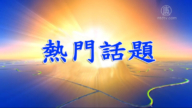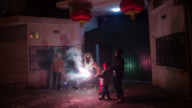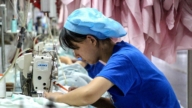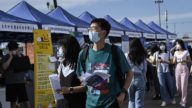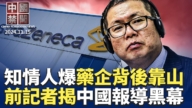【新唐人2014年07月10日訊】中共新聞出版廣電總局日前出臺新規,禁止新聞從業人員不得向其他境內外媒體和網站,提供相關職務信息等。評論分析,出臺這個新規,是限制新聞從業人員報導那些中共內部應該讓公眾知道,卻隱瞞不報的醜聞。
7月8號,大陸媒體刊登《新聞從業人員職務行為信息管理辦法》內容,《管理辦法》要求各新聞單位與所屬的新聞從業人員,必須簽訂保密承諾書、和職務行為信息保密協議。
新規定禁止新聞從業人員向其他境內外媒體、或網站提供所謂的「職務行為信息」﹔還禁止通過博客、微博、微信等公眾賬號、或個人賬號,以及論壇、講座等任何場所,透露和發佈「職務行為信息」。
新規認定,新聞從業人員在從事採訪、參加會議、聽取傳達、閱讀文件等職務活動中,獲取的各類信息、素材以及所採製的新聞作品,其中包含的國家秘密、商業秘密、和未公開披露的信息等,都屬於「職務行為信息」。
原《河北人民廣播電臺》編輯朱欣欣表示,這些規定是中共幾十年來對新聞媒體人一貫採取的作法,只不過現在被正式擺上了檯面。
原《河北人民廣播電臺》編輯朱欣欣:「實際上中共搞這個法規,就是為了限制記者洩露它們內部的這些醜聞,內部一些它們試圖隱瞞的,該讓公眾知道的,但是它卻隱瞞不報的,不讓大家知道的這樣的信息,實際上它是找這個藉口,甚麼都成了國家機密了,在中國,不應當是機密的它也是列為機密。」
今年5月初,中國資深女記者高瑜,被中共當局以涉嫌觸犯「境外非法提供國家秘密罪」刑事拘留。中共喉舌報導說,高瑜去年8月,將一份中共的所謂「機密文件」提供給境外網站刊登,引發多家網站轉載。
中共所指稱的這份文件,是去年5月,中共下達各級官員及高等院校學習的「七不講」禁令。
前《中國民營》雜誌記者劉逸明:「從新聞自由的角度講,記者、媒體人沒有保密的義務,所謂的國家機密應該是屬於保密人員它不應該向記者和媒體透露的,所以說即使記者和媒體所報導的新聞涉及到國家機密,我覺得這個責任也不在記者和媒體,而在於真正的國家的工作人員。」
朱欣欣認為,哪些信息是屬於國家機密,必須保密的範圍﹖中共應該制定相關法規,制定好後由保密人員去執行。
朱欣欣:「你不需要讓公眾知道的話,你就可以保密,你封鎖這些信息,你就可以不接待記者的採訪,首先在你這兒應該是把住這個關,你不能說你的信息你洩露了,你埋怨記者,你等於說把這個責任推給記者。」
劉逸明表示,現在中國媒體生存空間越來越狹窄,甚麼是國家機密又沒一個標準,所謂的「職務行為信息」也語焉不詳,這樣很容易造成媒體人被當局以洩密為由整肅。
劉逸明:「很多記者也都很清楚,在中國是,慾加之罪,何患無辭,即使很多記者所報導的內容不是真正的國家機密,但是因為對對方不利,所以有可能會因此而被警方以洩密為由進行抓捕。」
6月18號,中共國家新聞出版廣電總局發佈通告,禁止記者擅自作批評報導。美國中文雜誌《北京之春》主編胡平指出,目前中國的傳統媒體和網路媒體多達上萬家,中共對真正的洩密者根本無能為力。
美國中文雜誌《北京之春》主編胡平:「海外很多媒體整天在登這些小道消息,就是被你官方所禁止的消息,哪些消息從哪來的呢?包括當局它不可能完全不知道,但是它就是無可奈何,因為他們派別,黨內權力鬥爭本身各自出於他們自己的政治需要,實際上也不斷在違犯他們自己的規定。」
胡平表示,如今互聯網普及,各種信息多如牛毛,即使當局出臺再嚴格的規定,也無法完全屏蔽個人發佈信息的渠道。
採訪/朱智善 編輯/李韻 後製/陳建銘
Secret or scandal?
The State Administration of Press, Publication, Radio, Film
and Television of the People’s Republic of China (SAPPRFT)
ban reporter leaking
The SAPPRFT has released new regulations to prohibit
journalists providing duty related information to domestic or
foreign medias and websites.
It’s commented the new regulation is to restrict the Chinese
Communist Party (CCP) inner scandals that should be known
by the public.
July 8, mainland media published the content of the
journalists’ duty behavior and information management.
It requires all media and journalists to sign a
confidentiality and job behavior information agreement.
The new regulations prohibit journalists providing the
so-called official information to other domestic or
foreign media and websites.
It also prohibited releasing official information through
public or personal account in blog, microblog, WeChat, as well
as forums, seminars or any other places.
The new regulations believe all information and materials, as
well as the news works including state secrets, commercial
secrets and undisclosed information, etc.
are official information.
This includes job activities
such as interviews, meetings, the conveying and
documents as well.
The former Hebei People’s Radio editor Zhu Xinxin said that
these are the consistent approach to the journalist from CCP for
decades, just they are on the table now.
Zhu Xinxin: 302 The CCP’s regulation is to restrict the
reporters to release internal scandals which they are trying
to hide but should be public.
They are trying to find an excuse to make everything a state
secret, even it’s not confidential.
In early May, senior female reporter Gao Yu, was detained by
the Chinese authorities on suspicion of illegally providing
state secrets to overseas.
The CCP mouthpiece said last August, Gao Yu provided a
so-called confidential document to overseas websites which
made many websites reprinted.
The confidential document was the prohibition of seven things
not allowed to be said, issued by the CCP to all levels of
officials and institutions of high learning.
Former Chinese private magazine reporter Liu Yiming: From the perspective of freedom of press, reporters and media people
have no obligation on the confidentiality.
The so-called state secrets shouldn’t be released by
the confidential person.
So even the news is related to state secrets, the
responsibility is not on the reporters and the media,
but the real national staff.
Zhu Xinxin thinks that the CCP should formulate the law and
regulations on the scope of state secrets.
The confidential person will execute it later.
Zhu Xinxin: You can keep the secret and block the information
without letting the public know.
You should hold the pass first not to release the information
and accept the interview.
It’s equal to shifting the responsibility onto the reporters
when you blame the reporters after having released
information on them.
Liu Yiming said that the Chinese media living space has
become increasingly narrow now.
There is no standard for state secrets.
The so-called official information is not detailed.
It is easy for authorities to purge media people with
the excuse of leaking information.
Liu Yiming: Many reporters know that a staff is quickly
found to beat a dog in China.
Even though the information is not a state secret,
the reporters are still easy to arrest with the excuse of
leaking as long as the information is detrimental to the CCP.
June 18, the SAPPRFT issued a ban to prohibit the
reporters’ unauthorized comments.
US Chinese magazine Beijing Spring chief editor Hu Ping
pointed out that the CCP can do nothing to the true leaker
because China traditional media and online media are up in
the tens of thousands.
Hu Ping: overseas media posted lots of banned rumors often.
Where did they get the information?
The authorities shouldn’t be completely unaware of where
they get it.
However, they can do nothing, because their faction struggle,
inner Party power struggle stem from their own needs, which
make them violate their rules constantly.
Hu Ping said the Internet is very popular offering plenty and
a variety information.
Even though the authorities have issued stricter rules, they
cannot completely shield channels
for personal publishing of information.
Interview/Zhu Zhishan Edit/Li Yun Post-Production/Chen Jianming


